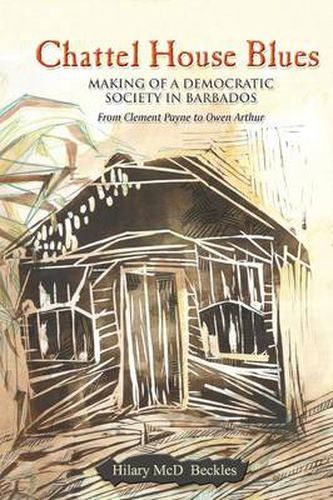Readings Newsletter
Become a Readings Member to make your shopping experience even easier.
Sign in or sign up for free!
You’re not far away from qualifying for FREE standard shipping within Australia
You’ve qualified for FREE standard shipping within Australia
The cart is loading…






This title is printed to order. This book may have been self-published. If so, we cannot guarantee the quality of the content. In the main most books will have gone through the editing process however some may not. We therefore suggest that you be aware of this before ordering this book. If in doubt check either the author or publisher’s details as we are unable to accept any returns unless they are faulty. Please contact us if you have any questions.
The remaking of colonial Barbados as a postmodern nation state has its political roots buried deep within the past. In Chattel House Blues, Hilary Beckles sets out to rewrite modern Barbadian history by centring the evolution of the nation in centuries of grassroots struggle. Democracy in Barbados, he argues, as a social, political and cultural reality, has its origins principally within working class demands for freedom, justice and equality and not as a bestowal upon the masses by elites at moments of imperial and colonial enlightenment. In the second volume of his trilogy, Great House Rules: Landless Emancipation and Workers’ Protest in Barbados 1838-1938, Prof. Beckles convincingly shows that for the first one hundred years after emancipation, an unbroken chain of resistance, protest and agitation for democratic governance, resulted in a decisive breach in the walls of the structures of white supremacy culminating in the Clement Payne Movement and the Riots of 1937. Black workers and their middle class allies secured Universal Adult Suffrage in 1950 and finally politically independence in 1966, ending the ‘Great House Rule’ that had begun three hundred years earlier. This process he further argues, reached maturity in 1994 when Owen Arthur, a young man from the chattel house in the plantation tenantry became prime minister. Independence and nationhood, though critical markers in the journey towards social justice and equity d not mean an end to the struggle. The politically enfranchised workers have since risen to an appreciation of their economic rights and the issue of popular economic democracy is now seen as the next step I civil rights development that Barbadians must confront. Chattel House Blues connects current political thinking with the historical process. In producing this work of historical literature that emphasises a people-centred culture of change and transformation, Prof. Beckles’ thesis is challenging if not controversial and is bound to result in widespread debate among Barbadians at home and in the diaspora.
$9.00 standard shipping within Australia
FREE standard shipping within Australia for orders over $100.00
Express & International shipping calculated at checkout
This title is printed to order. This book may have been self-published. If so, we cannot guarantee the quality of the content. In the main most books will have gone through the editing process however some may not. We therefore suggest that you be aware of this before ordering this book. If in doubt check either the author or publisher’s details as we are unable to accept any returns unless they are faulty. Please contact us if you have any questions.
The remaking of colonial Barbados as a postmodern nation state has its political roots buried deep within the past. In Chattel House Blues, Hilary Beckles sets out to rewrite modern Barbadian history by centring the evolution of the nation in centuries of grassroots struggle. Democracy in Barbados, he argues, as a social, political and cultural reality, has its origins principally within working class demands for freedom, justice and equality and not as a bestowal upon the masses by elites at moments of imperial and colonial enlightenment. In the second volume of his trilogy, Great House Rules: Landless Emancipation and Workers’ Protest in Barbados 1838-1938, Prof. Beckles convincingly shows that for the first one hundred years after emancipation, an unbroken chain of resistance, protest and agitation for democratic governance, resulted in a decisive breach in the walls of the structures of white supremacy culminating in the Clement Payne Movement and the Riots of 1937. Black workers and their middle class allies secured Universal Adult Suffrage in 1950 and finally politically independence in 1966, ending the ‘Great House Rule’ that had begun three hundred years earlier. This process he further argues, reached maturity in 1994 when Owen Arthur, a young man from the chattel house in the plantation tenantry became prime minister. Independence and nationhood, though critical markers in the journey towards social justice and equity d not mean an end to the struggle. The politically enfranchised workers have since risen to an appreciation of their economic rights and the issue of popular economic democracy is now seen as the next step I civil rights development that Barbadians must confront. Chattel House Blues connects current political thinking with the historical process. In producing this work of historical literature that emphasises a people-centred culture of change and transformation, Prof. Beckles’ thesis is challenging if not controversial and is bound to result in widespread debate among Barbadians at home and in the diaspora.